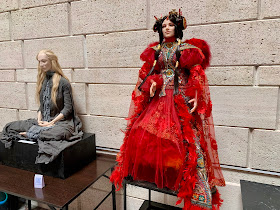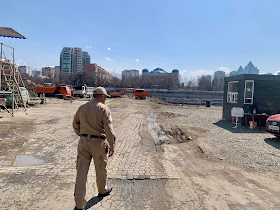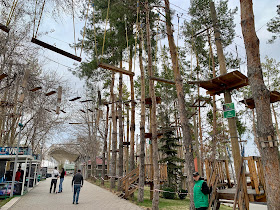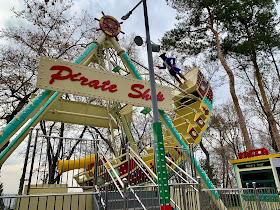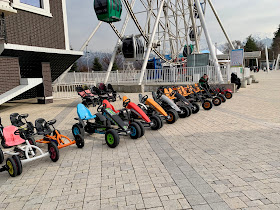So, a walk back to the Metro station and got advice from a friendly lady in a nearby car sales room as to what bus to get. She tried hard but the bus stops around the area were many and most confusing. Eventually I managed, with the help of a local lad who spoke English, to find a bus (No.73 if you are interested) which took me to Almaty 1 railway station, a 25 min journey.
Being an ex-Soviet country I was amazed how all the people I have dealt with so far have been so cheerful and helpful. I wondered where the traditional bolshy unhelpful Soviet-style 'Nyet-merchants' had gone. I found them at Almaty 1 train station. The ladies at the ticket and so-called 'information' office there (they were all ladies) were the most dour, unhelpful and sour-faced 'babushkas'. NO English! They did not even try to communicate. Their smile muscles had been removed. Fortunately the WiFi worked and I managed to communicate, eventually, via the 'translate' app with much reluctance on their behalf. I managed to buy a ticket to Bishkek, departing 06.40am on the 4th. The distance (on the map), by road, between Almaty and Bishkek is about 180 miles. My ticket read that I would arrive in Bishkek at 10.50pm! What!! 16 hours for 180 miles?
The hotel got me a splendid and efficient 'Yandex' cab at 5.15am on the 4th which arrived within 3 minutes and took only 20 mins or so to get to Almaty 1 station and cost a mere £2.50p (equiv). Time to spare at the station and I tried, without success, to get exact platform and departure times from the sullen babushkas at the ticket desk. No! Just look at the sign board….which was very confusing. At least the cafés were open.
Anyway, I somehow found the correct platform and while waiting for the train met a charming young Russian man who spoke good English. He was a lawyer and was waiting for a train bringing some of his belongings from family in Russia. He had 'escaped' to work in Almaty about three years ago to avoid conscription at the beginning of the Ukraine conflict. He told me that other professionals such as himself had done likewise.
The train, about 20 carriages long, duly arrived. I found my carriage and was 'greeted' by a somewhat grumpy lady, who spoke no English, who inspected my passport and ticket. I had a 'couchette' compartment to myself.
Left: My 'couchette' accommodation. It was perfectly functional, if basic, with no power points and certainly no WiFi (I had not yet downloaded an e-sim card which later in my travels proved invaluable) and I was given a sort of mattress to lay on the seat. I discovered that of the 9 compartments in this carriage only three were occupied.
The 'lady' official and another male functionary had a small room at one end of the carriage and there was a very primitive and rather dirty tin 'toilet' which did not flush at the other end. There was absolutely no form of buffet car, carriage service or any means of finding 'refreshments'. I had taken the precaution of bringing a tin of beer and a bag of nuts with me.
The train left 20 minutes late at 7.00am. It was the slowest train I have ever been on. Max speed in parts was about 50mph, but frequently dropped to not much more than walking pace and often just stopped in the middle of nowhere for no apparent reason!
Right: We travelled west along the border with Kyrgyzstan through entirely flat, featureless and almost deserted countryside. There was the occasional shed, or small farmstead, in the middle of nowhere. On one occasion I saw a tractor harrowing a field, miles from anywhere. There seemed to be no road and no habitation, other than the occasional dirt track, for at least 15 miles in any direction from this. How it got there and from where and to grow what, and why, it was difficult to imagine. There were the occasional flocks of sheep and small herds of goats and horses, again in the middle of nowhere. Even the occasional camel. I failed to get photos of these.
Incidentally, why is it a 'flock' of sheep and a 'herd' of goats? There is a shep'herd', and a goat'herd'. Just asking. I'm sure my efficient research agency, OMPITA, will have the answer.
The answer from OMPITA was, as always, promptly forthcoming:
The terms ‘flock’ and ‘herd’ are nouns used to describe groups of animals contingent upon their behaviour. The distinction between the two is somewhat subtle and in the case of sheep, who collectively behave in a flock like manner, this results in them being described as a flock as opposed to a herd.
Flocks take flight as a group all simultaneously following a leader - especially birds. Herding animals simply graze together and don’t necessarily all flee in unison when spooked.
I think that groups of humans could therefore be described as 'flocks'!
The train stopped, for no apparent reason, on several occasions at very dilapidated homesteads such as this (left). Nobody got on or off; well they couldn't as there was no platform and the drop from the train door to the ground was at least 6 feet.
Right: Another seemingly pointless stop. All these shabby dwellings had grotty outside 'toilets', and I never noticed any humans present. All rather baffling! How do they get their 'supplies' and from where? The occasional cow, donkey, horse, goat and even a camel at one such place were tethered outside.
We stopped at two villages (according to my vague GoogleMaps reading), namely Otar at 9.00am and Chu at 12.45pm. The train, when it did stop at a station, was often parked between lines of freight wagons carrying oil and petrol (Kazakhstan has large oilfields and refineries and is a comparatively wealthy country as a result).
In between having naps, I ventured along to the cabin containing the lady official, and her uncommunicative fellow male colleague. Deploying my finest chat-up technique I did manage, despite the language barrier and intermittent use of her 'translate' app on her i-phone (she had a WiFi connection although not too good at using it) to establish quite a friendly rapport. She then made me mugs of instant coffee at £1 per mug……quite an advance. There were never any announcements, and even if there had been I would not have understood them. I did meet one of my 4 fellow passengers in the carriage passageway, an affable young man from the area of Turkistan, but although he spoke no English he did help the lady with her 'translate app'.
I had little idea of where we were going. It seemed, after we had travelled further west, that we then headed north, then west again and eventually south-east for hours and for little obvious purpose. At about 3.15pm we stopped at quite a large town, Lugovoy, and it was at a platform this time. There were a few people wandering about but, again, I didn't notice anyone getting on or off. After 45 minutes we set off again, in the opposite direction. Presumably the driver had returned from his 4 course lunch break. I couldn't help reminisce that if this train had been in many other, especially 'far-eastern' countries there would have been swarms of vendors climbing aboard to sell food and drinks to the, by now, starving and thirsty passengers. I had drunk my tin of beer hours ago and down to my last few nuts.
At 6.10pm (I was keeping note of these times as I had little else to do) we stopped in the area of Merki, short of the border with Kyrgyzstan, for the Kazakh exit customs check. A team of officials plus a sniffer dog worked their way down the carriages. They carried out a comprehensive search of the compartment, made me open and rummaged through my bags, took photos and details electronically, and the dog sniffed away (my socks were of particular interest to it and probably ruined its delicate sense of smell). Then, after much perusal, they stamped my passport, thankfully. I'm not sure if there were other teams working on board this long train, but we moved off again after about 1hr 20mins. To stop again inside Kyrg (for short) near the town of Kayngdy, for their entry customs check which followed much the same tedious routine. They make a real meal of these checks and I'm not sure why….there must be a lot of baddies trying to cross the border. Off again at 8.40pm for the short distance east to Bishkek and arrived at 10.45pm (local)…Kyrg is 1 hour ahead of Kazak.
The railway station in Bishkek, fairly deserted at this time of night, is at the southern end of town. My little hotel (called, coincidently, My Hotel) booked 'on spec' the day before was in Chuy Prospect, a main street running east-west across the northern end. It was about 2.5 kms away. I walked. I needed the exercise! Thankfully with the use of a very basic Lonely Planet town map and my phone (Google Maps, which does not need WiFi to show you where you are), I got there at 11.55pm. Phew! Quite a journey. It makes GWR in UK look fast and efficient.
The lady receptionist at My Hotel was delightfully welcoming and even told me where to go, nearby, to get some rations from a large supermarket surprisingly open at this time of night. It was a very pleasant (and relatively cheap at £30pn) hotel.
Before I forget, I learnt the word for 'thank you' in Kazakh, which is 'raschmiet'. In Krygh it is 'raschmat'. You might find this useful?
Still miles, three weeks, behind with this journal and much more interesting things to come from Bishkek, and beyond…..












